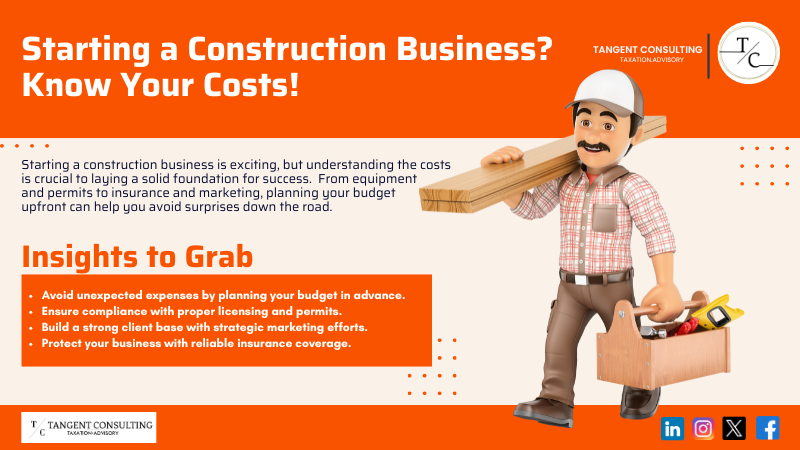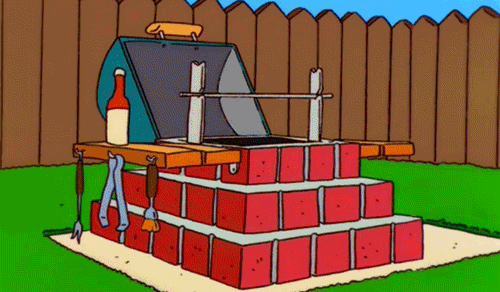Construction Business Startup Costs You Need to Know
Construction Business Startup Costs You Need to Know

As a kid, Legoss (a name we created for the heck of this situation) could spend hours surrounded by LEGO bricks, building skyscrapers. While other kids were out playing tag, Legos was busy designing his dream world.
Fast-forward to today, Legoss has been working in the construction business for more than a decade, and finally, he decided to turn his passion into a business.
But he didn’t know what construction business startup costs were.
The story of Legoss illustrates that many dreamers, like Legoss, don’t have any idea about costs of starting a construction business.
In this guide, we’ll walk you through essential expenses you need to know before starting a construction business. So, buckle up!

Why is startup cost important?
Did you know that 20% of small businesses fail within their first year? This statistic is especially relevant to the construction industry, where costs can balloon quickly.
Startup costs dictate how you allocate resources, ensure you’re prepared for the unexpected, and ultimately set the tone for your business’s operations.
If you underestimate the cost of purchasing equipment or securing permits, you could end up with delayed projects or, worse, losing clients. On the flip side, overestimating costs could lead to wasted funds.
To illustrate this, let’s bring our imaginary friend back. Legoss had the skills, passion, and a solid network of potential clients. But when he launched the construction business, he overlooked liability insurance and equipment maintenance. When his first big project came around, he didn’t have the cash flow to hire extra workers or cover unexpected material costs.
Understanding startup costs was a difficult lesson for Legoss. But for business owners like you, getting it right from the start ensures you can grow your business without any cracks.

Construction Business Startup Costs
The road to success is always under construction– Lily Tomlin
If there’s one industry where this quote fits, it’s construction. Starting your own construction business is exciting, but you need to plan every step and every dollar.
So, let’s get into the nuts and bolts of construction business startup costs.
1. Business Registration
Before starting any project, you need to build the legal foundation for your business. Registering your construction business is the first step toward legitimacy and ensures you’re operating within the law.
Business registration typically includes choosing a business structure (sole proprietorship, LLC, corporation, etc.), registering your business name, and obtaining necessary licenses. Depending on your location, you may also need a general contractor’s license or speciality licenses for certain types of work like plumbing or electrical.
Estimated Cost
- Business registration: $50–$500 (varies by state/province).
- Contractor’s license: $150–$600, depending on your state or certification requirements.
You should also research local requirements thoroughly. In some areas, you might also need zoning permits or environmental clearances, depending on the construction work you’ll be doing.
2. Insurance
Surprises aren’t always good, especially when working on a construction project. A missed nail or a surprise storm can cause accidental damage. So, it’s important to get insured.
Construction insurance typically includes:
- General liability insurance: Protects you against claims of property damage or injury caused by your work.
- Workers’ compensation insurance: Covers medical expenses and lost wages for employees injured on the job (often legally required).
- Builder’s risk insurance: Safeguards against damage to your project during construction.
- Commercial auto insurance: Covers vehicles used for business purposes.
Estimated Cost
- General liability insurance: $400–$2,000 annually, depending on the size and scope of your business.
- Workers’ compensation insurance: 1–8% of payroll costs, depending on your state and risk level.
- Builder’s risk insurance: Around 1–4% of total project costs.
Fun Fact: Some states offer discounts on workers’ comp premiums if you implement a certified safety program.
3. Construction Equipment
Did you know the global construction equipment market is projected to reach $229 billion by 2027? That’s not just a random number—it illustrates how crucial machinery is in the construction industry.
The type of equipment you need depends on the scope of your projects. Some of the construction equipment you’ll need is
- Heavy equipment like Excavators, bulldozers, and loaders.
- Power drills, saws, and concrete mixers.
- Hard hats, harnesses, and other protective equipment.
Estimated Costs
- Basic tools and gear: $5,000–$10,000.
- Heavy machinery: $10,000–$100,000+.
- Maintenance and repairs: 1–3% of equipment value annually.
When talking about construction equipment costs, you have two options: buying or renting.
Buying is best for long-term use and consistent projects. On the other hand, if you have a small budget, you can rent some of the equipment.

4. Office Space and Supplies
Even in the construction world, not everything happens on-site. Office space is where you sign contracts, finalize budgets, and meet with your clients. Whether it’s dedicated office space or a small home setup, you need to factor in these costs.
Office space involves renting out an office, utilities, basic office supplies, and software you’ll be using.
Estimated Costs
- Office space rental: $500–$3,000/month, depending on location and size.
- Utilities: $500–$5,000/month, depending on office size.
- Basic office setup: $1,000–$5,000 for furniture and supplies.
- Software subscriptions: $50–$500/month for tools like QuickBooks, project management software, and cloud storage. We’ll talk about software in detail later.
5. Employees
Your employees are your greatest asset—and also one of your biggest investments. Without the right team, even the best equipment and planning can fall flat.
When starting a construction business, you need skilled labor, administrative staff, and other important workers.
Estimated Costs
- Wages for skilled labor: $15–$40/hour, depending on expertise and location.
- Salaries for administrative staff: $30,000–$60,000/year.

6. Accounting Services
Accounting is no laughing matter when you’re starting a construction business. Managing finances is important for your business. It ensures your projects stay on budget and your cash flow remains steady. There is a range of accounting services which you can utilize, like
- Bookkeeping
- Tax Preparation
- Financial Reporting
- Compliance
Estimated Costs
- Professional accountant: $50–$150/hour, depending on experience and services.
- Outsourced accounting services: $300–$2,000/month for comprehensive support.
Fun Fact: Businesses that outsource their accounting functions grow faster than those that don’t. If you are preparing your mind for accounting services, you don’t have to go to the bottom of the Pacific Ocean. We offer complete accounting services from fractional CFO to tax prep. Check out all our services here.
7. Marketing
Even the best construction business won’t succeed if no one knows about it. Marketing is your megaphone, letting potential clients know about your business. A solid marketing strategy can gain you an edge over your competitors.
Estimated Costs
- Branding: $1,000–$5,000, depending on your business needs.
- Digital ads: $300–$1,000/month for Google or social media campaigns.
- Marketing materials: $200–$500 for business cards, brochures, and other promotional material.
8. Software
Construction businesses often work on multiple projects, teams, and clients. With the right software, you can simplify your business. There are a lot of tools you can use for the construction business. This involves:
- Project Management tools like Procore or Buildertrend.
- Accounting Software like QuickBooks or Xero.
- Estimation Software like PlanSwift or STACK
- CRM (customer relation management) tools like Jobber or Salesforce to manage client interactions and leads.
Estimated Costs
- Project management software: $99–$500/month, depending on features and team size.
- Accounting software: $20–$70/month.
- Estimation software: $50–$200/month.
- CRM tools: $29–$150/month.
These costs may be too much if you are starting out on a small budget. With that in mind, we partnered with QuickBooks and Jobber to give you two of the best tools for the construction industry.
With QuickBooks, you can get 80% off using our partner link.
With Jobber, you can get 20% off and a free trial. Checkout here.
9. Contingency Fund
As you know, surprises are common in construction. Weather delays, rising material costs, or last-minute client changes can throw your budget off. That’s why it’s important to have a contingency fund.
A contingency fund is a reserved portion of your budget set aside for unexpected expenses.
So, how much should you set aside?
Experts recommend allocating 5–15% of your total project costs to a contingency fund. For instance, if your project is estimated at $100,000, plan for an additional $5,000–$15,000 as a contingency.
10. Website
Your website is more than just an online presence—it’s your portfolio and your first impression. A well-designed website builds trust, showcases your work, and makes it easy for clients to contact you.
Estimated Costs
- Domain and hosting: $50–$150/year.
- Website design and development: $1,000–$5,000 (or more for custom sites).
- Ongoing maintenance: $50–$200/month.

Tips for Reducing Construction Business Startup Costs
Now that we’ve covered the essential startup costs for a construction business let’s talk about ways to lighten the financial load. Here’s how you can reduce startup costs:
- Begin with smaller projects and scale up as your business grows. This minimizes initial investments in equipment, labor, and marketing.
- Consider renting for rarely used or expensive machinery until you have a steady cash flow.
- Instead of hiring full-time staff for every role, outsource tasks like accounting, marketing, or IT to save on payroll and benefits.
- To keep costs low, use free trials, open-source tools, our partnered links, or affordable software for project management and accounting.
- Skip the office rental and operate from a home office until your revenue supports additional overhead.
- Build relationships with suppliers and negotiate bulk discounts or favorable payment terms.
- Prioritize cost-effective digital channels like social media and SEO instead of expensive traditional advertising.
- Consult a CPA to ensure you’re claiming all eligible tax deductions.
Final Thoughts
So, there you have it! These are some of the costs you have to take note of when starting a construction business. Running a successful construction business is about building a financially sustainable business.
Speaking of financial sustainability, Tangent Consulting has years of experience working with construction businesses in CFO services, bookkeeping, tax preparation, and business consulting.
PS If you are reading this, it means you can have access to our free consultation for your construction business. Avail this for free today before we change our mind 😉
FAQs
How to grow my small construction business?
Growing a small construction business requires delivering quality work, building strong client relationships, investing in marketing, and expanding your services gradually to meet market demands.
Is it easy to start your own construction company?
Starting a construction company requires careful planning, financial management, and meeting legal requirements. While it’s challenging, with the right strategy, it’s achievable.
What is the most profitable business in construction?
Specialized niches like luxury homebuilding, prefabricated home construction, and renovation services have higher profit margins.
